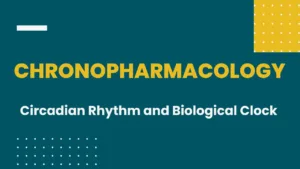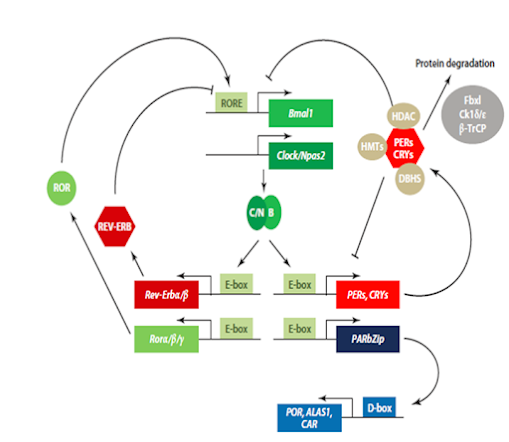Chronopharmacology

Objective
At the end of this lecture, the student will be able to:
• Explain Circadian Rhythm and Biological Clock
• Enumerate the Molecular Fundamentals of Circadian Clocks
• Discuss the applications of chronotherapy in diseases
Circadian Rhythm
• Any biological process that displays an endogenous, entrainable oscillation of about 24 hours driven by a circadian clock
• Circadian rhythms are endogenous (“built-in”, self-sustained), they are adjusted (entrained) to the local environment by external cues called zeitgebers – light, temperature etc.
• Zeitgebers- any external or environmental cue that synchronizes an organism’s biological rhythms to the Earth’s 24-hour light/dark cycle and 12-month cycle
• In medical science, an abnormal circadian rhythm in humans is known as circadian rhythm disorder
Some features of the Human Circadian (24-hour) Biological Clock
The canonical mammalian circadian oscillator and output for xenobiotic metabolism
Output genes involved in transcriptional control of the detoxification metabolism shown in blue.
ALAS1- aminolevulinic acid synthase 1
β-TrCP- β-transducin repeat-containing protein
CAR-constitutive androstane receptor
Ck1δ/ε– casein kinase 1 delta/epsilon
CRY– cryptochrome
Fbxl- F-box and leucine-rich repeat protein
PARbZip- proline and acidic amino acid–rich basic region/leucine zipper protein
PER- period
POR- cytochrome P450 oxidoreductase
ROR- retinoic acid receptor–related orphan receptor
RORE- ROR element.
Molecular Fundamentals of Circadian Clocks
• Two interlocked feedback loops composed of activators (green) and repressors (red) drive the expression of output genes important for xenobiotic metabolism
• Components of these loops use auxiliary factors like histone methyltransferases (HMTs), histone deacetylases (HDACs), Drosophila behavior/human splicing (DBHS) family RNA-binding proteins (beige), and kinases and proteasome machinery (gray)
From Circadian Control of Physiology to Chronopharmacology
• Neurotransmitters and Circadian Behavior
• Circadian Hormones, Cellular Clocks, and the Control of Metabolism, Digestion, and Cardiac Function
• Circadian Immune Regulation
Circadian Pharmacokinetics: Oscillations in Jejunal, Hepatic, and Renal Systems
• Rhythmic Gastric and Intestinal Absorption
• Rhythmic Liver Drug Metabolism
• Rhythmic Elimination by the Hepatobiliary System
• Rhythmic Elimination by the Kidney
Modulation of drug pharmacokinetics by the circadian clock
All rhythmic parameters influencing drug transport and metabolism are highlighted in red. Characteristic functions of the circadian clock in these processes are indicated in the respective organs.
ABC– ATP-binding cassette
ALAS- aminolevulinic acid synthase
CAR– constitutive androstane receptor
CYP- cytochrome P450;
DBP- D-albumin binding protein
HLF– hepatic leukemia factor
POR- P450 oxido-reductase
SLC– solute carrier Family
SULT-sulfotransferase
TEF- thyrotrophic embryonic factor
UGT– UDP-glucuronosyltransferase.
Chronobiological implications for drug treatment
• Successful chronotherapy are ones with obvious time-ofday-dependent symptoms
• Not only are PK/PD parameters modulated by time of day, but drug metabolism is as well
• For example, over-the-counter acetaminophen [analgesic N-acetyl-paminophenol (APAP)] is a leading cause of drug-induced liver failure in the United States
• APAP toxicity is dependent on generation of N-acetyl-p-benzoquinone imine (NAPQI) by the CYP P450 system of the liver (116), mainly CYP2E1 (92). APAP toxicity is time-of-day
Implications for Drug Discovery and Development
• The drug discovery process is preceded by the validation of a given target
• The mechanism of action is established and molecular targets defined
• Parameters evaluation are significantly of high cost, as the same parameters have to be checked multiple times a day
• However, online resources can be mined for information about the circadian expression of a given transcript or metabolite
• Once the target is confirmed and the lead optimization process has started, the properties of the novel chemical entities are evaluated and selected
• The recent findings that we have highlighted yield insight into the growing field of chronopharmacology and into the mechanistic basis for the variations in PK/PD that have been observed in a vast number of instances
• However, many important questions remain unanswered. Most if not all of the circadian expression data at the genomic level on which these conclusions are based are available only for rodents
• Considering the fact that the expression and functional properties of drug-metabolizing enzymes and drug transporters are highly species specific, extrapolation of these results to humans is not a foregone conclusion
• To translate research data to clinical application, significant progress in the characterization of circadian variations in protein expression and activity in humans is necessary
Applications of Chronotherapy in Diseases
• Chronopharmacotherapy of Asthma
• Chronopharmacotherapy of Peptic Ulcer Disease
• Chronopharmacotherapy of Hypertension
Summary
• Circadian rhythm is any biological process that displays an endogenous, entrainable oscillation of about 24 hours driven by a circadian clock
• Circadian rhythms are endogenous (“built-in”, self-sustained), they are adjusted (entrained) to the local environment by external cues called zeitgebers – light, temperature etc.
• Drug pharmacokinetics are modulated by the circadian clock
• Chronopharmacology is applicable in the therapy of many diseases



